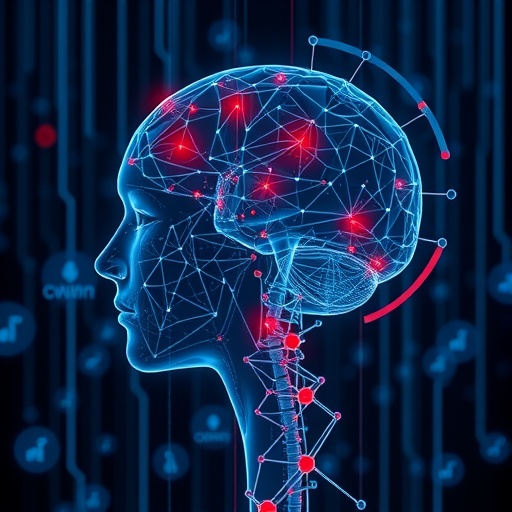In a pioneering advance poised to transform the landscape of psychiatric care, researchers have unveiled a novel machine learning framework that leverages “small data” to predict mental health crises with remarkable precision. Unlike conventional models that require extensive datasets, this innovative approach thrives on sparse, fragmented digital footprints—capturing subtle behavioral signals that typically elude clinical observation. The technique, encapsulated in the Tabular Prior-data Fitted Networks (TabPFN) paradigm, demonstrates unprecedented capacity to provide clinicians with actionable, real-time forecasts of depressive relapses and manic episodes, fundamentally redefining the paradigm of mental health monitoring.
Traditional psychiatric assessments represent a snapshot in time: clinicians rely on periodic interviews and standardized questionnaires, methods that are inherently limited by their frequency and subjectivity. This lag in detection often results in missed opportunities for early intervention, with many individuals experiencing full-blown crises before receiving appropriate care. The newly developed TabPFN framework circumvents these limitations by ingesting irregular, multimodal digital biomarkers—ranging from GPS-tracked social withdrawal patterns to nuanced metrics such as typing dynamics and sleep fluctuations. Crucially, these behavioral indices often manifest hours or days before clinical symptoms become overt.
TabPFN capitalizes on recent advances in Bayesian machine learning, enabling it to operate effectively on datasets with fewer than 100 data points per individual. This “small data” capability distinguishes it from deep learning models that typically demand vast amounts of information, thereby opening the door to personalized monitoring in real-world, privacy-sensitive environments. The model integrates uncertainty quantification directly into its predictions, providing clinicians with probability distributions rather than deterministic outcomes. For example, a forecast might report a “72% probability of relapse with a confidence interval of ±8%,” allowing a more nuanced interpretation of risk tailored to the patient’s context.
.adsslot_M7SWkQAsjh{ width:728px !important; height:90px !important; }
@media (max-width:1199px) { .adsslot_M7SWkQAsjh{ width:468px !important; height:60px !important; } }
@media (max-width:767px) { .adsslot_M7SWkQAsjh{ width:320px !important; height:50px !important; } }
ADVERTISEMENT
Beyond its core predictive power, the system is engineered for seamless clinical integration. Unlike standalone applications, these risk scores and alerts are designed to flow directly into electronic health record (EHR) systems, ensuring that mental health professionals receive timely notifications and can mobilize interventions promptly. This dynamic link between predictive analytics and clinical response embodies a shift from reactive care to proactive management, potentially averting crises before they escalate.
Technical challenges intrinsic to mental health data posed formidable hurdles—namely the irregularity and sparsity of input streams. Patients generate behavioral data intermittently, often with substantial gaps. TabPFN’s architecture applies prior knowledge and transfer learning to “fill in the blanks,” making coherent inferences about latent states even in the face of missing information. This capability is bolstered by the model’s capacity for real-time adaptation: predictions are updated continuously as new data trickle in, reducing latency from days to mere hours.
In bench trials, the framework proficiently anticipated bipolar disorder episodes up to 24 hours in advance—a timeframe critical for preventive interventions. GPS data revealing decreased social engagement paired with erratic typing rhythm served as compelling early indicators. Such fine-grained phenotyping transcends traditional symptom checklists, instead capturing the rhythm and texture of daily life as a barometer of mental health.
The researchers emphasize that this methodology does more than prognosticate symptoms; it detects underlying pathophysiological shifts manifested behaviorally, allowing for personalized risk scoring. “We bridge the gap between sparse digital phenotyping and actionable clinical insights,” explained Dr. Peng Wang, the study’s lead author associated with Vrije Universiteit Amsterdam and Erasmus Universiteit Rotterdam. This personalized approach contrasts with population-level risk estimates, tailoring intervention strategies to the idiosyncrasies of individual patients.
Looking forward, the investigators aim to validate their model through prospective clinical trials and explore deployment on edge computing devices, such as smartwatches. Edge deployment not only supports privacy preservation—by minimizing cloud-based data transmission—but also enables continuous, passive monitoring without burdening users. Such portable solutions could democratize access to precision psychiatry, bringing sophisticated risk prediction into everyday settings.
The convergence of behavioral neuroscience, digital phenotyping, and machine learning embodied in this work heralds a transformative chapter in mental healthcare. By leveraging small data and probabilistic modeling, clinicians gain an unprecedented window into the fluctuating dynamics of mental illness, facilitating earlier and more tailored interventions. This research charts a course toward an era where mental health crises are not merely treated but anticipated and preemptively managed.
Nonetheless, several questions remain open. The generalizability of TabPFN across diverse patient populations and psychiatric disorders awaits elucidation. Furthermore, establishing ethical guidelines for data privacy and consent in continuous digital monitoring will be paramount. The researchers acknowledge these complexities, underscoring their commitment to rigorous clinical validation.
In an era where mental illnesses impose mounting social and economic burdens globally, this small data machine learning approach offers a beacon of hope. It articulates a future in which digital behavioral indicators—once dismissed as noise—become vital signals harnessed to preserve mental well-being. By translating real-world behavioral heterogeneity into coherent predictive insights, this work reshapes both the science and practice of psychiatry.
Subject of Research:
Not applicable
Article Title:
Harnessing Small-Data Machine Learning for Transformative Mental Health Forecasting: Towards Precision Psychiatry With Personalised Digital Phenotyping.
Web References:
http://dx.doi.org/10.1002/mdr2.70017
Image Credits:
Wang et al./Med Research
Keywords:
Clinical trials
Tags: AI mental health predictionBayesian machine learning applicationsbehavioral signals for crisis predictiondepressive relapse forecastingdigital biomarkers in psychiatryearly intervention in mental healthinnovative psychiatric assessment methodsmachine learning in psychiatrymanic episode predictionreal-time mental health monitoringsmall data for mental healthTabular Prior-data Fitted Networks





